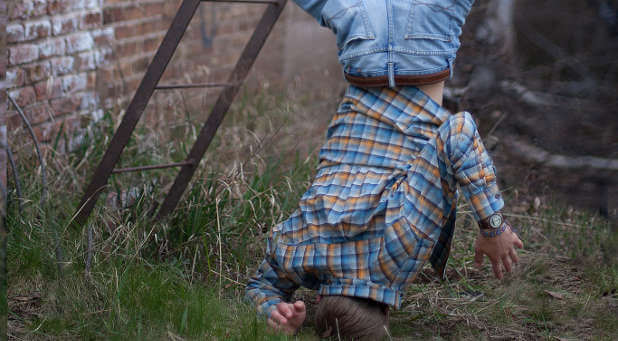Popular evangelical author A.W. Tozer once described spiritual failure: “Every farmer knows the hunger of the wilderness. … No matter how well-prepared the soil, how well-kept the fences … let the owner neglect for awhile his prized and valued acres and they will revert again to the wilds and be swallowed by the jungle or the wasteland. The bias of nature is toward the wilderness, never toward the fruitful field.”
The Fall
You would naturally think that by the time the pilgrim reached the 11th in this series of 15 psalms of ascent, he would be in a jubilant and expectant spiritual and psychological state of mind. Most of the upward climb to Zion lay behind and below. He could see the mountain crest not too far above him.
Have you been climbing a long time, making a lot of progress; but in one fell swoop, you’ve emotionally tumbled all the way down the trail? You’ve worked for months to get out of the doldrums, thought you had made progress, and now all the effort seems worthless. You’ve just gone through what the Psalmist speaks of here—a relapse, or Tozer’s reversion to wasteland.
With no human help left, you look to God who alone can decipher your need, as a discerning mother understands why her baby cries.
Psalm 130 reminds you that, although you feel you’re again at the bottom, in God’s reality you’re actually more than two-thirds of the way to the top. These are not psalms of descent, but ascent.
Forgiveness
When you deserve God’s help, you call for justice. When you don’t merit anything, you throw yourself upon the Lord’s mercy.
Guilt comes in varying degrees. Sometimes failure appears to be the work entirely of another. You got pushed off the cliff; you didn’t jump. Other times you fell prey to temptation. No one forced you. Your own sinful desires took you astray. At all times you must take responsibility for your feelings no matter how you crashed. A relatively innocent person may yet sin by wrongfully reacting to a situation he or she did not create.
The key to getting back on the trail lies in your willingness now to assume personal responsibility for whatever portion of your relapse or failure belongs to you alone.
God will forgive if you will ask. In fact, He’s ready to move from forgiveness to forgetfulness by keeping no “record of sins.”
Author Lee Davis tells the true story of a much-loved minister in the Philippines who carried the burden of a secret sin he had committed many years before. Even after repenting multiple times, he sensed no peace or forgiveness.
A woman in his parish deeply loved God and claimed to have visions in which she carried on conversations with the Lord. To test her, the minister said, “Next time you speak with Christ, I want you to ask Him what sin I committed while I was in seminary.”
A few days later he asked, “Well, did Christ visit you in your dreams?”
“Yes, He did,” she replied.
“And did you ask Him what sin I committed in seminary?”
“Yes,” she answered.
“Well,” pressed the minister, “What did He say?”
The godly woman answered, “He said, ‘I don’t remember.'”
Fellowship
When our relationship with the Lord is restored, we enjoy His presence. The psalm writer anticipates the Lord’s appearance with the same intensity as an all-night worker looks forward to the ending of his shift.
Not everyone has such eagerness in waiting. With what disposition do you wait upon the manifestation of His presence: as a child on Christmas Eve waiting to open gifts the next morning, or as a patient waiting for the dentist?
The night watchman spoken of in this psalm has a predictable duration to his night. You have a better advantage than the watchman whose expectation was that the Lord would appear to him in the morning. He’s with you right now through all the darkness (Matthew 28:20).
Fullness
The Lord does not offer empty words or incomplete solutions to your need. In Him there is “full redemption.”
The help you gain from Him enables you to testify to others that they likewise “put [their] hope in the Lord.”
Yes, Tozer was right. The tendency of the field moves toward relapse. But thank God, there is a higher law and a stronger power at work: the greatness of His might in you.
George O. Wood is the general superintendent of the Assemblies of God. For the original article, visit georgeowood.












